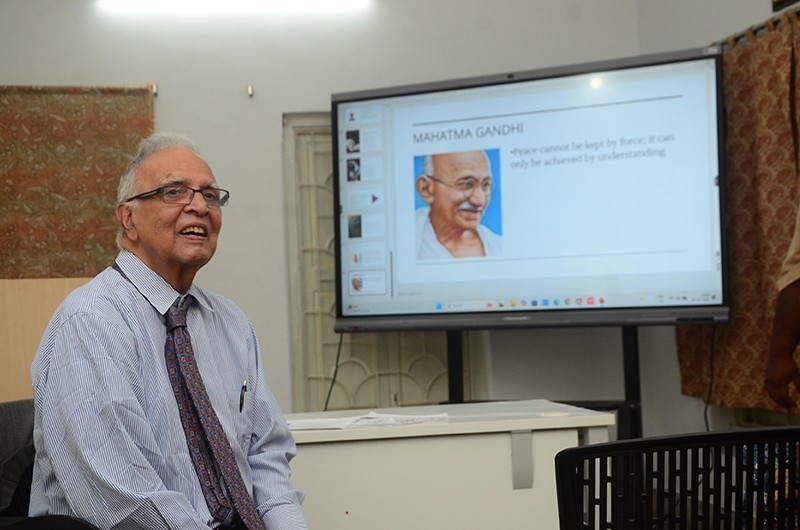 CSR
Prof. Manas Chatterji speaking at the MCHD session. Photo: Avishek Mitra/IBNS
CSR
Prof. Manas Chatterji speaking at the MCHD session. Photo: Avishek Mitra/IBNS
CSR in the Crossfire: Professor and practitioners debate over ethics in India Inc. at Kolkata's MCHD talk
Is Corporate Social Responsibility in India driving real change—or quietly breeding corruption behind a wall of glossy impact reports?
This explosive question set off a fiery debate at a recent lecture in Kolkata, where ethics, economics, and national pride collided head-on in front of a startled audience.
Senior scholar Prof. Manas Chatterji—an Indian-origin global academic from the State University of New York—was in the spotlight at a session on “Ethics, Culture and Corporate Social Responsibility in Developing Countries” at the Management Centre for Human Development (MCHD). But what began as a polished PowerPoint presentation quickly turned into a high-voltage war of ideas.
The moment Chatterji remarked that he had frequently “heard about CSR funds not being utilised properly,” murmurs rose in the room.
He added that he had come across reports of malpractices—though he was careful to state that this wasn’t the whole picture.
Suddenly, the audience wasn’t just listening—they were challenging. Several participants pushed back sharply, insisting that while “stray” misuse may occur, the majority of Indian companies follow the rules and uphold ethical commitments, and should not be painted with the same brush.
Prof. Manas Chatterji, an Emeritus Professor, School of Management, Binghamton University – State University of New York, was delivering a key lecture at the MCHD session and he was in fact comparing CSR and Ethics between developing countries, when the controversy started on his comments about India.
Chatterji started off with a detailed powerpoint presentation at the session which was held at the institute, which is located in Kolkata's cosmopolitan Bhawanipur area.
In an interesting remark, Professor Chatteji claimed he kept on hearing about the companies not utilising the funds properly for CSR activities as it should have been.
The senior professor noted he received information about several malpractices about the CSR funds, though he passed a disclaimer that the scenario was not the complete picture.
The lecturer was also challenged by the participants when he tried to pitch the American health system as something that should be followed by a third world country like India.
"If the US claims to have the best healthcare system, then why is the mortality rate higher there as compared to India," a serious question was thrown at Professor Chatterji from the audience when the discussion diagressed to the healthcare system.
However, Dr. Subir Chowdhury, former Director of IIM Calcutta and the founder chairman of Prof SKC Trust, who tried to provide some reason for India's lag citing the country's long colonial past, also mentioned that the mortality rate is high in the USA only for hospitalisation cases.
Dr. Chowdhury drew the attention to the Mughal and later British colonisation leaving a deep scar in India's progress story.
He says to judge someone's story, one has to check the history and India's growth story is now on a roll.
On Professor Chatterji's claims, RC Guria, a Chartered Accountant and Former Faculty of National Insurance Academy, says, "Precisely the presentation he has prepared may be relevant for other developing countries, but not for India with the fastest growing economy.
"Had the speaker updated his lectures and presentation, it would have been really very good and effective. These are my personal views. If I am wrong, I stand to be excused."
Adding to the debate, GM Kapur, member of the MCHD governing body, immediate past President of CMA and distinguished Alumnus of IIMC (he is deeply involved with Kolkata’s material heritage conservation as a livewire of the Indian National Trust for Art and Cultural Heritage or INTACH conservation institute) , observed that CSR in India has evolved significantly in recent years.
He noted that while vigilance against misuse is essential, CSR has played a positive and measurable role in community development, cultural preservation, and capacity building when implemented with transparency and purpose.
The session wrapped up with a spirited exchange of ideas, leaving the room charged with healthy debate and plenty of food for thought on the future of ethics and CSR in India.
(Photos by Avishek Mitra)
Top Headlines
-
News
Major aviation boost for Kashmir: Cabinet clears development of a new Civil Enclave at Srinagar International Airport
February 24, 2026
-
News
India urges all nationals to leave Iran 'by available means' as US-Iran tension grows
February 23, 2026
-
News
Ind.AI: Sovereignty, jobs, energy and the What If?
February 20, 2026
-
News
From car diplomacy to global strategy: Modi, Macron upgrade IndiaFrance ties
February 17, 2026
-
News
Seva Teerth: PM Modi inaugurates new PMO, announces these key decisions on first day
February 13, 2026
-
News
Hero of Operation Sindoor: IAF vice chief hails Rafale ahead of mega 114-jet deal
February 11, 2026
-
News
'Govt surrendered before Trump, sold Bharat Mata: Rahul Gandhi attacks Centre over IndiaUS trade deal
February 11, 2026
-
News
Painful times in my marriage: Melinda Gates reacts to Bill Gates being named in Epstein Files
February 05, 2026
-
News
Perverse act of self-immolation: Shashi Tharoor slams Washington Post after son Ishaans layoff
February 05, 2026
-
News
Is India moving away from the Dollar? Strategic shift in foreign reserves signals a new era
February 03, 2026





